40 F. high on Saturday (shortly after midnight - a bit misleading).
14 F. afternoon "high" yesterday at KMSP.
23 F. average high for January 12.
14 F. high on January 12, 2012.
Trace of snow flurries yesterday.
16.8" snow so far this winter in the metro. That's 9.8" less than average, to date.
0" snow on the ground in the Twin Cities.
14 F. afternoon "high" yesterday at KMSP.
23 F. average high for January 12.
14 F. high on January 12, 2012.
Trace of snow flurries yesterday.
16.8" snow so far this winter in the metro. That's 9.8" less than average, to date.
0" snow on the ground in the Twin Cities.

Freeze Dried
We can't seem to beg, borrow or buy a snowstorm,
but can I interest you in some ice? I have plenty in my yard; the
once-snowy lake nearby now a pale-blue super-sized frozen Slushie. Last
week added insult to injury for snow lovers: the thaw coupled with 30s
& 40s brought our official snow cover down to an inch. Snowfall for
the winter season is nearly 10 inches below average, to date. That snow
drought I talked about weeks ago is hanging tough. Nothing resembling a
"storm" is showing up on the maps looking out 2 weeks.
And this might be a good time to cash in some frequent flier miles.
Imagine bitter air approaching from Canada as a
small inland ocean of subzero air. It won't all sweep south at once -
waves or "pulses" of numbing air expanding and contracting, like the sea
at high tide. This week will be cold enough, but we thaw out (briefly)
Wednesday, again Saturday.Models seem to be crystallizing, with
the coldest air of winter grazing Minnesota next week. In fact a week
from today highs may struggle to reach zero.
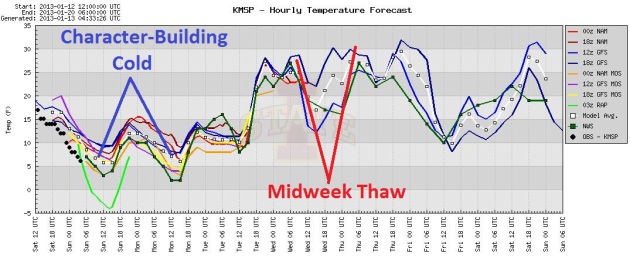 The First Wave. No, this isn't the real cold front.
Not yet. Think of this as the Opening Act. The Main Event comes next
week - probably the coldest week of winter. All the models warm us up a
little by midweek; 30s by Wednesday will feel oh so good.
The First Wave. No, this isn't the real cold front.
Not yet. Think of this as the Opening Act. The Main Event comes next
week - probably the coldest week of winter. All the models warm us up a
little by midweek; 30s by Wednesday will feel oh so good.
 Not For The Meteorologically Timid. ECMWF (European)
model guidance confirms a midweek thaw (40 not out of the question)
then colder by late week before another, smaller upward blip in
temperatures by Saturday. The Mother Lode of cold air may brush
Minnesota early next week, in fact the predicted high a week from
tomorrow is -4 F. We don't have much snow on the ground, which will
moderate the bitter air a bit, but there's little doubt that next week
will be very good for travel agents.
Not For The Meteorologically Timid. ECMWF (European)
model guidance confirms a midweek thaw (40 not out of the question)
then colder by late week before another, smaller upward blip in
temperatures by Saturday. The Mother Lode of cold air may brush
Minnesota early next week, in fact the predicted high a week from
tomorrow is -4 F. We don't have much snow on the ground, which will
moderate the bitter air a bit, but there's little doubt that next week
will be very good for travel agents.
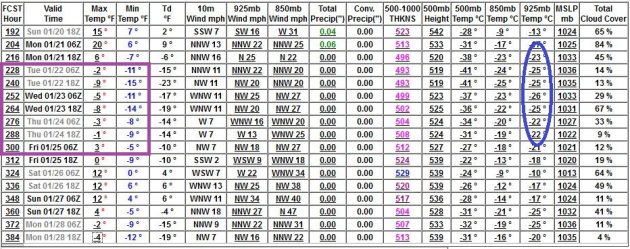 Coldest Cold Front of Winter? I may be jumping the
gun. It's entirely possible the core of the coldest air won't drain
south until the very end of January or even the first week of February,
but my gut (nausea?) is telling me that next week may be the worst of
it. Any time 850 mb temperatures are forecast to dip to -25 C or colder
you know you're in for a spell of negative numbers.
Coldest Cold Front of Winter? I may be jumping the
gun. It's entirely possible the core of the coldest air won't drain
south until the very end of January or even the first week of February,
but my gut (nausea?) is telling me that next week may be the worst of
it. Any time 850 mb temperatures are forecast to dip to -25 C or colder
you know you're in for a spell of negative numbers.
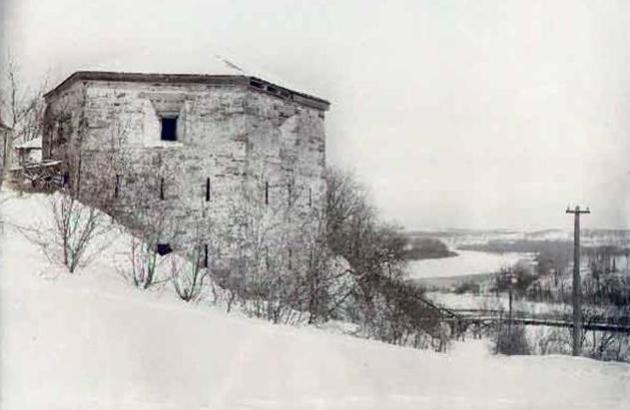 125 Years Ago Deadly "Children's Blizzard" Blasted Minnesota.
It wasn't Minnesota's worst blizzard, but it was our deadliest, for a
variety of reasons documented in this excellent article at MinnPost.com. Here's an excerpt: "...Climate
historians are quick to note that the “Children’s Blizzard” — so named
because many of the victims were schoolkids trying to make it home —
was not the most extreme blizzard ever to strike Minnesota. But 125
years later, it remains the most deadly, due to a tragic swirl of
circumstances. The storm’s ambush approach in the middle of an
afternoon, the lack of warning from the Army Signal Corps, and the mild,
January thaw-like morning were all factors that conspired to kill with
maximum efficiency. Minnesota, too, was populated like never before,
but many of her new homes and schoolhouses were hastily built affairs
at best, with gap-holed walls and tar paper roofs, thrown up in the
break-neck excitement of westward settlement. The storm happened at the
tail-end of a six-year run of extreme weather called the “Little Ice
Age.”...
125 Years Ago Deadly "Children's Blizzard" Blasted Minnesota.
It wasn't Minnesota's worst blizzard, but it was our deadliest, for a
variety of reasons documented in this excellent article at MinnPost.com. Here's an excerpt: "...Climate
historians are quick to note that the “Children’s Blizzard” — so named
because many of the victims were schoolkids trying to make it home —
was not the most extreme blizzard ever to strike Minnesota. But 125
years later, it remains the most deadly, due to a tragic swirl of
circumstances. The storm’s ambush approach in the middle of an
afternoon, the lack of warning from the Army Signal Corps, and the mild,
January thaw-like morning were all factors that conspired to kill with
maximum efficiency. Minnesota, too, was populated like never before,
but many of her new homes and schoolhouses were hastily built affairs
at best, with gap-holed walls and tar paper roofs, thrown up in the
break-neck excitement of westward settlement. The storm happened at the
tail-end of a six-year run of extreme weather called the “Little Ice
Age.”...
Photo credit above: "Nobles County native Morton Bassett: "It was a beautiful day for mid-winter and no one even thought of what a change an hour's time could bring." Courtesy: Minnesota Historical Society.
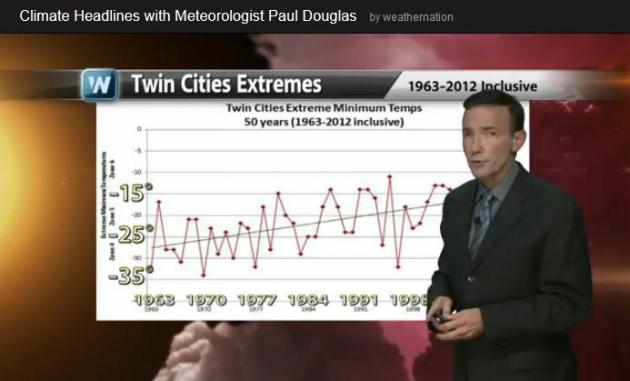 Tracking The Trends. No, it's not getting as cold as
it did 30-50 years ago. Yesterday's blog had details of a consistent
warming trend (the map above showing the coldest nighttime lows at MSP
every winter as tracked by investment banker and rose enthusiast Jack
Falker in Edina). Today I expand on this, including looking at heating
degree day data from the NWS - via YouTube.
Tracking The Trends. No, it's not getting as cold as
it did 30-50 years ago. Yesterday's blog had details of a consistent
warming trend (the map above showing the coldest nighttime lows at MSP
every winter as tracked by investment banker and rose enthusiast Jack
Falker in Edina). Today I expand on this, including looking at heating
degree day data from the NWS - via YouTube.
 Experts Divided On Weather And Flu Link. Here's a story that made me do a triple-take: could unusually dry weather help to trigger (or amplify) the flu? The Capital Weather Gang takes a look - here's an excerpt: "...Rather
than cold weather, it may be dry weather which can help predict flu
outbreaks. In 2010, Jeffrey Shaman and colleagues published research
showing flu outbreaks often occurred immediately following a dry spell.
“This dry period is not a requirement for triggering an influenza
outbreak, but it was present in 55 to 60 percent of the outbreaks we
analyzed so it appears to increase the likelihood of an outbreak,”
Shaman told Health magazine.
“The virus response is almost immediate; transmission and survival
rates increase and about 10 days later, the observed influenza mortality
rates follow....”
Experts Divided On Weather And Flu Link. Here's a story that made me do a triple-take: could unusually dry weather help to trigger (or amplify) the flu? The Capital Weather Gang takes a look - here's an excerpt: "...Rather
than cold weather, it may be dry weather which can help predict flu
outbreaks. In 2010, Jeffrey Shaman and colleagues published research
showing flu outbreaks often occurred immediately following a dry spell.
“This dry period is not a requirement for triggering an influenza
outbreak, but it was present in 55 to 60 percent of the outbreaks we
analyzed so it appears to increase the likelihood of an outbreak,”
Shaman told Health magazine.
“The virus response is almost immediate; transmission and survival
rates increase and about 10 days later, the observed influenza mortality
rates follow....”
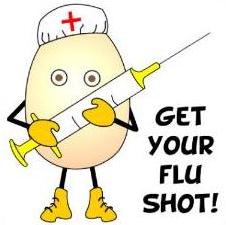 Flu Myths: 7 Common Beliefs, Busted. Here's an interesting angle on the flu (epidemic) from Huffington Post: "As we face one of the earliest -- and most deadly -- flu outbreak in years, many are flooding emergency rooms and scrambling to get vaccinated. (Speaking of which, it's not too late!
Vaccinating in the fall, before flu season really kicks off, is most
effective, but experts still recommend getting the vaccine now.) A
crucial part of staying healthy -- this flu season and beyond -- is
staying informed. Click through the slideshow below to get the truth
behind some of the most common myths about the flu..."
Flu Myths: 7 Common Beliefs, Busted. Here's an interesting angle on the flu (epidemic) from Huffington Post: "As we face one of the earliest -- and most deadly -- flu outbreak in years, many are flooding emergency rooms and scrambling to get vaccinated. (Speaking of which, it's not too late!
Vaccinating in the fall, before flu season really kicks off, is most
effective, but experts still recommend getting the vaccine now.) A
crucial part of staying healthy -- this flu season and beyond -- is
staying informed. Click through the slideshow below to get the truth
behind some of the most common myths about the flu..."
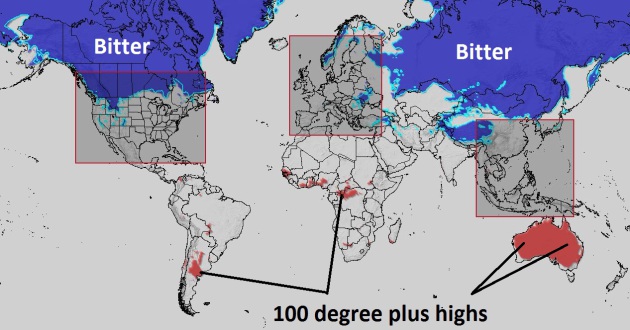 Heat, Flood Or Icy Cold. Extreme Weather Rages Worldwide. Here's an excerpt of a New York Times story: "Brush fires are raging across Australia, fueled by a record-shattering heat wave. Pakistan was inundated by unexpected flooding in September.
A vicious storm bringing rain, snow and floods just struck the Middle
East. And in the United States, scientists confirmed this week what
people could have figured out simply by going outside: last year was the hottest
since records began. “Each year we have extreme weather, but it’s
unusual to have so many extreme events around the world at once,” said
Omar Baddour, chief of the data management applications division at the
World Meteorological Organization, in Geneva. “The heat wave in
Australia; the flooding in the U.K., and most recently the flooding and
extensive snowstorm in the Middle East — it’s already a big year in
terms of extreme weather calamity.”
Heat, Flood Or Icy Cold. Extreme Weather Rages Worldwide. Here's an excerpt of a New York Times story: "Brush fires are raging across Australia, fueled by a record-shattering heat wave. Pakistan was inundated by unexpected flooding in September.
A vicious storm bringing rain, snow and floods just struck the Middle
East. And in the United States, scientists confirmed this week what
people could have figured out simply by going outside: last year was the hottest
since records began. “Each year we have extreme weather, but it’s
unusual to have so many extreme events around the world at once,” said
Omar Baddour, chief of the data management applications division at the
World Meteorological Organization, in Geneva. “The heat wave in
Australia; the flooding in the U.K., and most recently the flooding and
extensive snowstorm in the Middle East — it’s already a big year in
terms of extreme weather calamity.”
Global temperature extreme map above courtesy of Ham Weather.
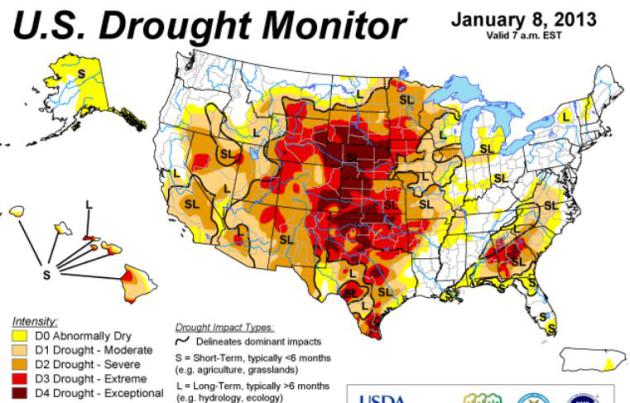 USDA Declares 597 U.S. Counties Drought Disaster Areas. Here's the introduction to a story from The Guardian Express: "U.
S. Agriculture Sec. Tom Vilsack indicated that the United States
Department of Agriculture has designated 597 counties in the United
States as primary natural disaster areas due to extended drought and
heat. This designation makes all qualified farm operators in these areas
eligible for low-interest emergency loans. This is just the 1st round
of disaster designations made by the US Department of Agriculture in
2013. “As drought persists, the USDA will continue to partner with
producers to see them through longer-term recovery, while taking this
with actions needed to help farmers and ranchers prepare their land and
operations for the upcoming planting season,” said Sec. Vilsack...."
USDA Declares 597 U.S. Counties Drought Disaster Areas. Here's the introduction to a story from The Guardian Express: "U.
S. Agriculture Sec. Tom Vilsack indicated that the United States
Department of Agriculture has designated 597 counties in the United
States as primary natural disaster areas due to extended drought and
heat. This designation makes all qualified farm operators in these areas
eligible for low-interest emergency loans. This is just the 1st round
of disaster designations made by the US Department of Agriculture in
2013. “As drought persists, the USDA will continue to partner with
producers to see them through longer-term recovery, while taking this
with actions needed to help farmers and ranchers prepare their land and
operations for the upcoming planting season,” said Sec. Vilsack...."
* the latest U.S. Drought Monitor is here.
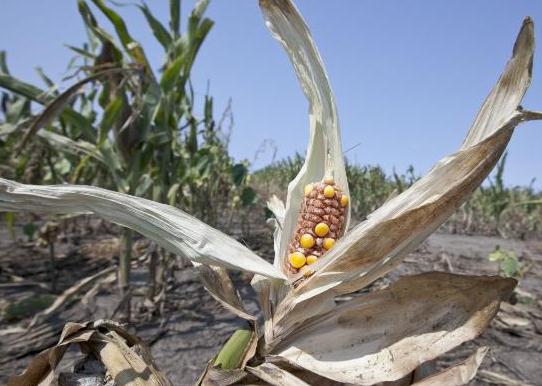 USDA's Final Crop Report For 2012 Shows Farmers Lost About Quarter Of Corn To Ongoing Drought. The Star Tribune has details - here's an excerpt: "The
federal government released its final crop report for 2012 on Friday,
detailing heavy losses caused by the worst drought the U.S. has
experienced since the 1950s. Much of the attention focused on corn,
which is widely used as an ingredient in many foods and as feed for
livestock. Farmers produced less than three-fourths of the corn the
U.S. Department of Agriculture anticipated when planting was done in
the spring. The year-end report shows a harvest of 10.78 billion
bushels, 27 percent less than the agency's initial estimate of 14.8
billion bushels. The harvest, however, was still one of the largest in
U.S. history. Farmers say better crop technology that improved the
ability of corn to withstand drought saved them from more devastating
losses, and production was helped by the large number of acres planted
this year..."
USDA's Final Crop Report For 2012 Shows Farmers Lost About Quarter Of Corn To Ongoing Drought. The Star Tribune has details - here's an excerpt: "The
federal government released its final crop report for 2012 on Friday,
detailing heavy losses caused by the worst drought the U.S. has
experienced since the 1950s. Much of the attention focused on corn,
which is widely used as an ingredient in many foods and as feed for
livestock. Farmers produced less than three-fourths of the corn the
U.S. Department of Agriculture anticipated when planting was done in
the spring. The year-end report shows a harvest of 10.78 billion
bushels, 27 percent less than the agency's initial estimate of 14.8
billion bushels. The harvest, however, was still one of the largest in
U.S. history. Farmers say better crop technology that improved the
ability of corn to withstand drought saved them from more devastating
losses, and production was helped by the large number of acres planted
this year..."
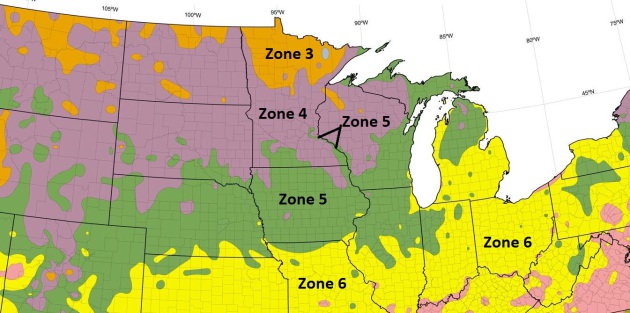 Parts Of Twin Cities Metro In USDA Plant Hardiness Zone 5.
As I mentioned in yesterday's blog (courtesy of Jack Falker in Edina)
our warming climate means that things are growing here that weren't
growing here a generation ago. Click here to see the latest USA map,
courtesy of thebiopod.com.
Parts Of Twin Cities Metro In USDA Plant Hardiness Zone 5.
As I mentioned in yesterday's blog (courtesy of Jack Falker in Edina)
our warming climate means that things are growing here that weren't
growing here a generation ago. Click here to see the latest USA map,
courtesy of thebiopod.com.
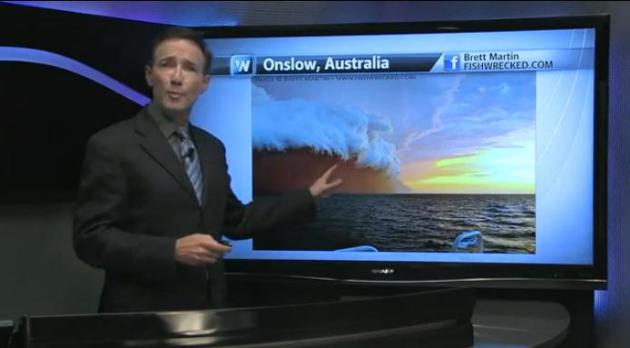 Crazy Weather Down Under. Check out the "haboob"
images from Australia - and harrowing stories of entire families leaping
into nearby lakes to escape flames and "fire tornadoes". These are a
few of the symptoms of the worst heat on record for Australia and
Tasmania - details via YouTube.
Crazy Weather Down Under. Check out the "haboob"
images from Australia - and harrowing stories of entire families leaping
into nearby lakes to escape flames and "fire tornadoes". These are a
few of the symptoms of the worst heat on record for Australia and
Tasmania - details via YouTube.
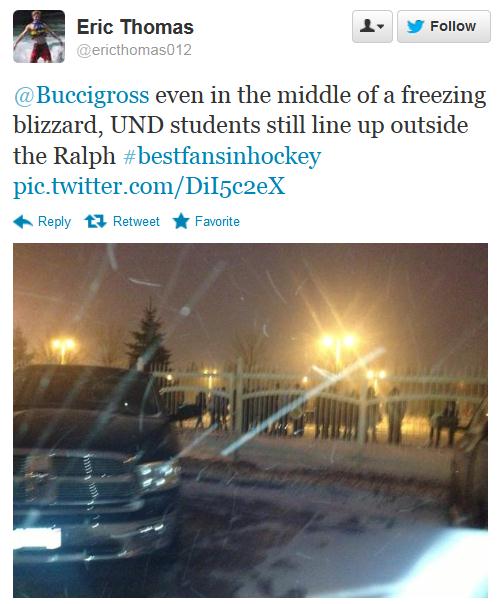
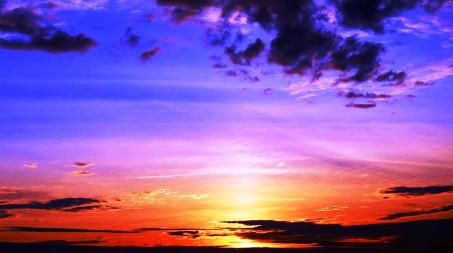 Technicolor Sunset. Thanks to Timothy Butz, who snapped this photo
near his home in Ellicott City, Maryland, where temperatures may reach
the 60s and 70s tomorrow. By the end of next week the wind chill may
approach zero in this area. Enjoy the (fleeting) thaw!
Technicolor Sunset. Thanks to Timothy Butz, who snapped this photo
near his home in Ellicott City, Maryland, where temperatures may reach
the 60s and 70s tomorrow. By the end of next week the wind chill may
approach zero in this area. Enjoy the (fleeting) thaw!
 The McMansion Of Tablets. I'm feeling a little insecure about my tablet right now, after getting a glimpse of this one, courtesy of gizmag.com: "Panasonic might be getting outshined a little at CES 2013 as competitors like LG and Samsung
show off their unique takes on 4K-resolution TVs, but that doesn't
mean it didn't find its own creative use for 4K technology. On the show
floor, the company demoed a new 20-inch tablet that runs Windows 8 on a
4K resolution ISP-alpha display..."
The McMansion Of Tablets. I'm feeling a little insecure about my tablet right now, after getting a glimpse of this one, courtesy of gizmag.com: "Panasonic might be getting outshined a little at CES 2013 as competitors like LG and Samsung
show off their unique takes on 4K-resolution TVs, but that doesn't
mean it didn't find its own creative use for 4K technology. On the show
floor, the company demoed a new 20-inch tablet that runs Windows 8 on a
4K resolution ISP-alpha display..."

 Goosebumps (and goosebulges). What a mixed up
Saturday; the high coming around midnight, and then temperatures fell
like a rock behind a vigorous cold front - falling thru the teens by
afternoon statewide. International Falls picked up nearly 2" of new snow
(11" on the ground). Duluth and St. Cloud report 4" of (gently
used) snow on the ground.
Goosebumps (and goosebulges). What a mixed up
Saturday; the high coming around midnight, and then temperatures fell
like a rock behind a vigorous cold front - falling thru the teens by
afternoon statewide. International Falls picked up nearly 2" of new snow
(11" on the ground). Duluth and St. Cloud report 4" of (gently
used) snow on the ground.
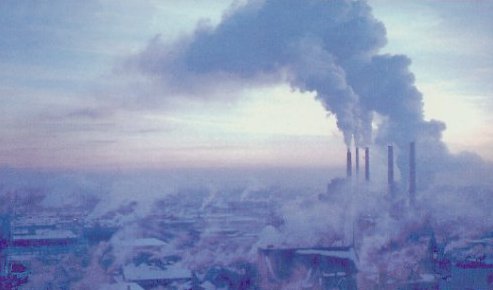
Paul's Conservation Minnesota Outlook for the Twin Cities and all of Minnesota:
Climate Stories...
"Average U.S. temperatures have risen roughly 1.5 degrees F since 1895, and more than 80 percent of that increase has occurred since 1980, the report concludes." - excerpt of a story at The Hill
.
Impact Of Climate Change Hitting Home, U.S. Report Finds. Climate scientists have been saying this for 10-15 years or longer, and now it's dawning on most Americans that, yes, maybe something has changed. Here's an excerpt from Reuters: "The consequences of climate change are now hitting the United States on several fronts, including health, infrastructure, water supply, agriculture and especially more frequent severe weather, a congressionally mandated study has concluded. A draft of the U.S. National Climate Assessment, released on Friday, said observable change to the climate in the past half-century "is due primarily to human activities, predominantly the burning of fossil fuel," and that no areas of the United States were immune to change. "Corn producers in Iowa, oyster growers in Washington State, and maple syrup producers in Vermont have observed changes in their local climate that are outside of their experience," the report said..."
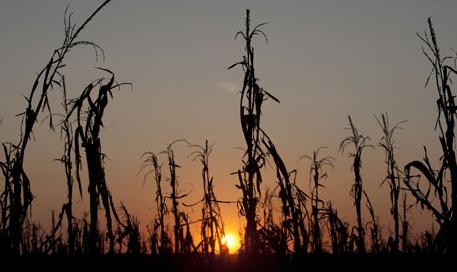 Climate Change Set To Make America Hotter, Drier And More Disaster-Prone. More details on the latest U.S. National Climate Assessment from the U.K. Guardian: "Future generations of Americans can expect to spend 25 days a year sweltering in temperatures above 100F (38C), with climate change on course to turn the country into a hotter, drier, and more disaster-prone place. The National Climate Assessment, released in draft form on Friday
, provided the fullest picture to date of the real-time effects of
climate change on US life, and the most likely consequences for the
future. The 1,000-page report, the work of the more than 300 government
scientists and outside experts, was unequivocal on the human causes of
climate change, and on the links between climate change and extreme
weather. "Climate change is already affecting the American people," the
draft report said..."
Climate Change Set To Make America Hotter, Drier And More Disaster-Prone. More details on the latest U.S. National Climate Assessment from the U.K. Guardian: "Future generations of Americans can expect to spend 25 days a year sweltering in temperatures above 100F (38C), with climate change on course to turn the country into a hotter, drier, and more disaster-prone place. The National Climate Assessment, released in draft form on Friday
, provided the fullest picture to date of the real-time effects of
climate change on US life, and the most likely consequences for the
future. The 1,000-page report, the work of the more than 300 government
scientists and outside experts, was unequivocal on the human causes of
climate change, and on the links between climate change and extreme
weather. "Climate change is already affecting the American people," the
draft report said..."
Photo credit above: "The report says steps taken by Obama to reduce emissions are 'not close to sufficient' to prevent the most severe consequences of climate change." Photo: Saul Loeb/AFP
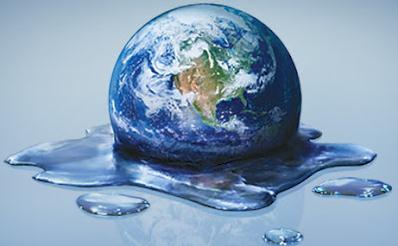 Reports Says Warming Is Changing U.S. Daily Life. Here's more on the 1,146 page draft climate assessment report in an excerpt from Huffington Post Tech: "..."Human-induced
climate change means much more than just hotter weather," the report
says, listing rising-seas, downpours, melting glaciers and permafrost,
and worsening storms. "These changes and other climatic changes have
affected and will continue to affect human health, water supply,
agriculture, transportation, energy, and many other aspects of
society." The report uses the word "threat" or variations of it 198
times and versions of the word "disrupt" another 120 times. If someone
were to list every aspect of life changed or likely to be altered from
global warming, it would easily be more than 100, said two of the
report's authors..."
Reports Says Warming Is Changing U.S. Daily Life. Here's more on the 1,146 page draft climate assessment report in an excerpt from Huffington Post Tech: "..."Human-induced
climate change means much more than just hotter weather," the report
says, listing rising-seas, downpours, melting glaciers and permafrost,
and worsening storms. "These changes and other climatic changes have
affected and will continue to affect human health, water supply,
agriculture, transportation, energy, and many other aspects of
society." The report uses the word "threat" or variations of it 198
times and versions of the word "disrupt" another 120 times. If someone
were to list every aspect of life changed or likely to be altered from
global warming, it would easily be more than 100, said two of the
report's authors..."
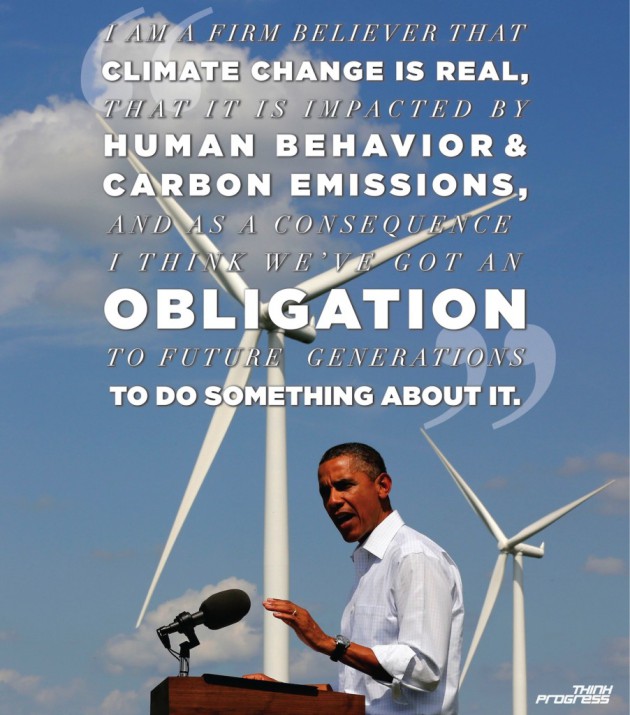 Dear Mr. President: Time To Deal With Climate Change. Here's a snippet of an article at MIT Technology Review; a direct appeal from the editors of this leading publication to President Obama: "...Renewable
energy sources, like solar and advanced biofuels, are simply not yet
ready to compete with fossil fuels. Solar power, for example, still
generates less than 1 percent of our nation’s electricity and, under
most circumstances, remains much more expensive than electricity
generated from fossil fuels. We need new and far more advanced
technologies. Creating cleaner ways to produce energy will require
inventions in physics and chemistry labs and innovations in how we
scale up and test those inventions. And it will require market
incentives, such as a tax or some other price on carbon dioxide
emissions, to encourage consumers and industry to use clean energy..." (Photo credit: Think Progress).
Dear Mr. President: Time To Deal With Climate Change. Here's a snippet of an article at MIT Technology Review; a direct appeal from the editors of this leading publication to President Obama: "...Renewable
energy sources, like solar and advanced biofuels, are simply not yet
ready to compete with fossil fuels. Solar power, for example, still
generates less than 1 percent of our nation’s electricity and, under
most circumstances, remains much more expensive than electricity
generated from fossil fuels. We need new and far more advanced
technologies. Creating cleaner ways to produce energy will require
inventions in physics and chemistry labs and innovations in how we
scale up and test those inventions. And it will require market
incentives, such as a tax or some other price on carbon dioxide
emissions, to encourage consumers and industry to use clean energy..." (Photo credit: Think Progress).
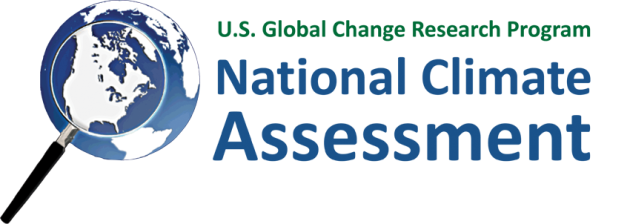 National Climate Assessment Details Stronger Evidence Of Global Warming And Its Impacts. Huffington Post provides more perspective on changes that are already showing up. We've gone from theory to reality: "...Summers
are longer and hotter, and periods of extreme heat last longer than
any living American has ever experienced. Winters are generally shorter
and warmer. Rain comes in heavier downpours, though in many regions
there are longer dry spells in between. Other changes are even more
dramatic. Residents of some coastal cities see their streets flood more
regularly during storms and high tides. Inland cities near large
rivers also experience more flooding, especially in the Midwest and
Northeast. Hotter and drier weather and earlier snow melt mean that
wildfires in the West start earlier in the year, last later into the
fall, threaten more homes, cause more evacuations, and burn more
acreage...."
National Climate Assessment Details Stronger Evidence Of Global Warming And Its Impacts. Huffington Post provides more perspective on changes that are already showing up. We've gone from theory to reality: "...Summers
are longer and hotter, and periods of extreme heat last longer than
any living American has ever experienced. Winters are generally shorter
and warmer. Rain comes in heavier downpours, though in many regions
there are longer dry spells in between. Other changes are even more
dramatic. Residents of some coastal cities see their streets flood more
regularly during storms and high tides. Inland cities near large
rivers also experience more flooding, especially in the Midwest and
Northeast. Hotter and drier weather and earlier snow melt mean that
wildfires in the West start earlier in the year, last later into the
fall, threaten more homes, cause more evacuations, and burn more
acreage...."
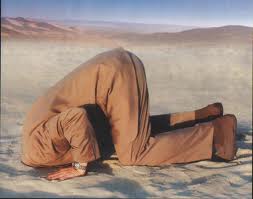 Global Warming Skeptics: What Do They Have To Fear? Here's an excerpt of a story at Christian Science Monitor that caught my eye: "For
one, climate skeptics fear that people who are not qualified to opine
on the complex topic of energy production may cripple economies with
assorted misguided energy related boondoggles. Is that a realistic
concern? What are the odds? I’m going to argue here that the odds are
not zero. I offer as anecdotal evidence, the above video Debating The New Environmentalism hosted
by Bryan Walsh, which I will eventually parse below. Interestingly
enough, all three participants are wearing nearly identical shirts. Only
Bill McKibben thought to wear his red power tie..."
Global Warming Skeptics: What Do They Have To Fear? Here's an excerpt of a story at Christian Science Monitor that caught my eye: "For
one, climate skeptics fear that people who are not qualified to opine
on the complex topic of energy production may cripple economies with
assorted misguided energy related boondoggles. Is that a realistic
concern? What are the odds? I’m going to argue here that the odds are
not zero. I offer as anecdotal evidence, the above video Debating The New Environmentalism hosted
by Bryan Walsh, which I will eventually parse below. Interestingly
enough, all three participants are wearing nearly identical shirts. Only
Bill McKibben thought to wear his red power tie..."
 Climate Change May Have Confused, Trapped Killer Whales. You may have heard about this story on Hudson Bay, which froze up unusually late this year. Voice of America reports: "A
pod of killer whales trapped in the ice of Canada’s Hudson Bay
successfully has left the small opening where they were gasping for
breath, but marine specialists say global warming could cause more
incidents like this. Lyne Morissette, a marine researcher with the St. Lawrence Global Observatory in Quebec, said the
12 orcas may simply have gotten lost while hunting for seals and other
food, but it’s more likely they got stuck in the ice because of
climate change. “They tend to base their migration on temperature, but
based on the fact that temperature is changing in the Arctic, and the
water is warmer, maybe they didn’t get the signal,” she said..."
Climate Change May Have Confused, Trapped Killer Whales. You may have heard about this story on Hudson Bay, which froze up unusually late this year. Voice of America reports: "A
pod of killer whales trapped in the ice of Canada’s Hudson Bay
successfully has left the small opening where they were gasping for
breath, but marine specialists say global warming could cause more
incidents like this. Lyne Morissette, a marine researcher with the St. Lawrence Global Observatory in Quebec, said the
12 orcas may simply have gotten lost while hunting for seals and other
food, but it’s more likely they got stuck in the ice because of
climate change. “They tend to base their migration on temperature, but
based on the fact that temperature is changing in the Arctic, and the
water is warmer, maybe they didn’t get the signal,” she said..."
 Your Weatherman Probably Denies Global Warming. Yes,
I know a few deniers in town, but this particular weatherman does not
deny the science. Who else in town has been talking about this,
publically, for over 15 years? Here's an excerpt from salon.com: "...For
instance, when it comes to weather forecasters, a recent Rolling Stone
magazine assessment of the local news scene found that “there’s a
shockingly high chance that your friendly TV weatherman is a full-blown
climate denier.” The report cited a 2010 survey finding that in the
vast wasteland of Ron Burgundys, only half of all local weather
forecasters believe climate change is even happening, and fewer than a
third acknowledge the scientific evidence proving that it is “caused
mostly by human activities.” Not surprisingly, their forecasts often
omit any discussion of climate change’s effect on the weather systems,
thus forfeiting a chance to properly contextualize severe weather
events..."
Your Weatherman Probably Denies Global Warming. Yes,
I know a few deniers in town, but this particular weatherman does not
deny the science. Who else in town has been talking about this,
publically, for over 15 years? Here's an excerpt from salon.com: "...For
instance, when it comes to weather forecasters, a recent Rolling Stone
magazine assessment of the local news scene found that “there’s a
shockingly high chance that your friendly TV weatherman is a full-blown
climate denier.” The report cited a 2010 survey finding that in the
vast wasteland of Ron Burgundys, only half of all local weather
forecasters believe climate change is even happening, and fewer than a
third acknowledge the scientific evidence proving that it is “caused
mostly by human activities.” Not surprisingly, their forecasts often
omit any discussion of climate change’s effect on the weather systems,
thus forfeiting a chance to properly contextualize severe weather
events..."
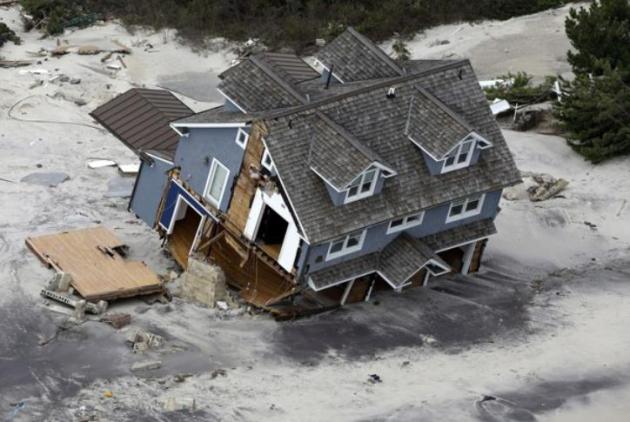 Effects Of Climate Change Will Be Felt More Deeply In Decades Ahead, Draft Report Says. The Washington Post has some breaking (climate) news; here's an excerpt: "...The
report’s executive summary states that not only have extreme weather
and climate events become more frequent in recent years, “there is new
and stronger evidence that many of these increases are related to human
activities.” The report adds that these changes are exacting an
economic toll on infrastructure across the country; it also identifies
specific vulnerabilities in the Washington region, such as the
Chesapeake Bay, which it said was threatened by changing land use
patterns and the changing climate. Virginia Beach ranks among the nation’s “most vulnerable port cities,” according to the assessment, after Miami, the New York City area, New Orleans and Tampa-St. Petersburg...."
Effects Of Climate Change Will Be Felt More Deeply In Decades Ahead, Draft Report Says. The Washington Post has some breaking (climate) news; here's an excerpt: "...The
report’s executive summary states that not only have extreme weather
and climate events become more frequent in recent years, “there is new
and stronger evidence that many of these increases are related to human
activities.” The report adds that these changes are exacting an
economic toll on infrastructure across the country; it also identifies
specific vulnerabilities in the Washington region, such as the
Chesapeake Bay, which it said was threatened by changing land use
patterns and the changing climate. Virginia Beach ranks among the nation’s “most vulnerable port cities,” according to the assessment, after Miami, the New York City area, New Orleans and Tampa-St. Petersburg...."
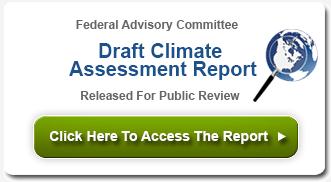 Photo credit: Washington Post. You can access the Draft Climate Assessment Report here (series of large PDF files).
Photo credit: Washington Post. You can access the Draft Climate Assessment Report here (series of large PDF files).
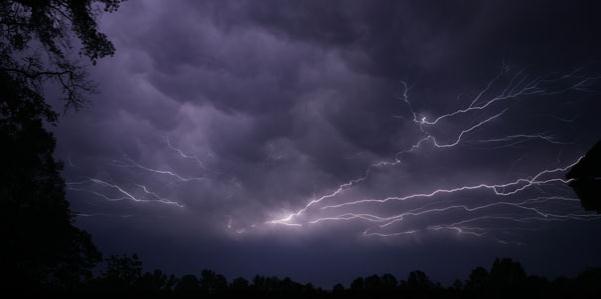 Report: Climate Change Triggers Extreme Weather Events. Politico has the story; here's the introduction: "Human
activities play a primary role in causing climate change, and evidence
is mounting that those changes will lead to more frequent extreme
weather events, according to a major draft report that will be released
later Friday. The draft of the third National Climate Assessment comes
as the Northeast continues to recover from devastation caused by
Hurricane Sandy and just days after the National Oceanic and
Atmospheric Administration said 2012 was the hottest year
on record in the contiguous United States. The draft report, which runs
more than 1,000 pages and was approved for release Friday by a federal
advisory committee, warns that “human induced climate change is
projected to continue and accelerate significantly if emissions of heat
trapping gases continue to increase...” (photo credit: AP).
Report: Climate Change Triggers Extreme Weather Events. Politico has the story; here's the introduction: "Human
activities play a primary role in causing climate change, and evidence
is mounting that those changes will lead to more frequent extreme
weather events, according to a major draft report that will be released
later Friday. The draft of the third National Climate Assessment comes
as the Northeast continues to recover from devastation caused by
Hurricane Sandy and just days after the National Oceanic and
Atmospheric Administration said 2012 was the hottest year
on record in the contiguous United States. The draft report, which runs
more than 1,000 pages and was approved for release Friday by a federal
advisory committee, warns that “human induced climate change is
projected to continue and accelerate significantly if emissions of heat
trapping gases continue to increase...” (photo credit: AP).
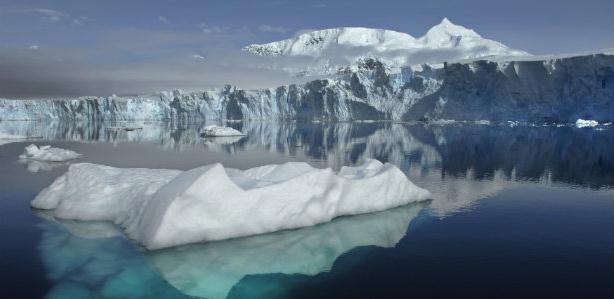 Climate Change Doesn't Have To Mean The End Of The World. Here's an excerpt of a story at The Atlantic: "This
week the National Climate Data Center confirmed what most had long
believed: 2012 was the warmest year on record for the United States.
Ever. And not just a bit warmer: a full Fahrenheit degree warmer than
in 1998, the previous high. In the land of climatology statistics, that
is immense. In the understatement of one climate scientist, these
findings are "a big deal." Almost every news story reporting on this
juxtaposed the record with a series of disruptive climate events,
ranging from the drought that covered much of the United States
farmland and punctuated by Hurricane Sandy in its tens of billions of
dollars of devastation. Many also pointed out that eight of the 10
warmest years have occurred since 1990 (though it should be noted that
official records only extend to 1895). Not surprisingly, these
observations were almost always followed by warnings of more warming
and substantially worse consequences to come..."
Climate Change Doesn't Have To Mean The End Of The World. Here's an excerpt of a story at The Atlantic: "This
week the National Climate Data Center confirmed what most had long
believed: 2012 was the warmest year on record for the United States.
Ever. And not just a bit warmer: a full Fahrenheit degree warmer than
in 1998, the previous high. In the land of climatology statistics, that
is immense. In the understatement of one climate scientist, these
findings are "a big deal." Almost every news story reporting on this
juxtaposed the record with a series of disruptive climate events,
ranging from the drought that covered much of the United States
farmland and punctuated by Hurricane Sandy in its tens of billions of
dollars of devastation. Many also pointed out that eight of the 10
warmest years have occurred since 1990 (though it should be noted that
official records only extend to 1895). Not surprisingly, these
observations were almost always followed by warnings of more warming
and substantially worse consequences to come..."
Photo credit above: Reuters.
 NASA Proves Global Warming Changes From Above. Here's a clip from The Guardian Express: "Starting
this month, NASA will send a remotely piloted research aircraft as
high as 65,000 feet over the tropical Pacific Ocean to probe unexplored
regions of the upper atmosphere for answers to how a warming climate
is changing Earth. The first flights of the Airborne Tropical Tropopause
Experiment (ATTREX), a multi-year airborne science campaign with a
heavily instrumented Global Hawk aircraft, will take off from and be
operated by NASA’s Dryden Flight Research Center atEdwards Air Force
Base in California. The Global Hawk is able to make 30-hour flights.
Water vapor and ozone in the stratosphere can have a large impact on
Earth’s climate. The processes that drive the rise and fall of these
compounds, especially water vapor, are not well understood..."
NASA Proves Global Warming Changes From Above. Here's a clip from The Guardian Express: "Starting
this month, NASA will send a remotely piloted research aircraft as
high as 65,000 feet over the tropical Pacific Ocean to probe unexplored
regions of the upper atmosphere for answers to how a warming climate
is changing Earth. The first flights of the Airborne Tropical Tropopause
Experiment (ATTREX), a multi-year airborne science campaign with a
heavily instrumented Global Hawk aircraft, will take off from and be
operated by NASA’s Dryden Flight Research Center atEdwards Air Force
Base in California. The Global Hawk is able to make 30-hour flights.
Water vapor and ozone in the stratosphere can have a large impact on
Earth’s climate. The processes that drive the rise and fall of these
compounds, especially water vapor, are not well understood..."
 Hot Enough For You? Here's a portion of an Op-Ed from Eugene Robinson at The Washington Post: "...So
we’re going to deal with climate change whether we like it or not.
We’re going to spend many billions of dollars over the coming years
providing disaster relief in the wake of hurricanes and other
destructive weather events. If we’re a bit smarter, we’ll spend even
more to protect our coastal cities from storm surges of the kind that
devastated parts of New York. Investment in barriers and floodwalls will
ultimately save both money and lives. But if we were really smart,
we’d be talking about how to mitigate the ultimate damage by weaning
ourselves from coal, oil and other energy sources that produce carbon
emissions. We see what looks like disaster looming but don’t even talk
about it, because the politics of climate change are inconvenient.
Future generations will curse our silence."
Hot Enough For You? Here's a portion of an Op-Ed from Eugene Robinson at The Washington Post: "...So
we’re going to deal with climate change whether we like it or not.
We’re going to spend many billions of dollars over the coming years
providing disaster relief in the wake of hurricanes and other
destructive weather events. If we’re a bit smarter, we’ll spend even
more to protect our coastal cities from storm surges of the kind that
devastated parts of New York. Investment in barriers and floodwalls will
ultimately save both money and lives. But if we were really smart,
we’d be talking about how to mitigate the ultimate damage by weaning
ourselves from coal, oil and other energy sources that produce carbon
emissions. We see what looks like disaster looming but don’t even talk
about it, because the politics of climate change are inconvenient.
Future generations will curse our silence."
 How American Cities Are Adapting To Climate Change. Think Progress
has a story about how cities are taking the lead on mitigating climate
change - also hardening infrastructure to make the symptoms of a warmer
atmosphere (more extreme heat and rainfall) less damaging: "A new report
by the International Council for Local Environmental Initiatives
highlights twenty local government across the country that are taking
the initiative to combat global warming. The report follows up an
earlier survey
ICLEI did of 298 American cities, which found that 74 percent had
perceived changes in the climate — including increased storm intensity,
higher temperatures, and more precipitation. Almost two-thirds are
pursuing adaptation planning for climate change, compared to 68 percent
globally, and virtually all U.S. cities report difficulties acquiring
funding for adaptation efforts. (Only Latin American cities reported
similar levels of difficulty.) And over one-third of U.S. cities said
the federal government does not understand the realities of climate
change adaptation..."
How American Cities Are Adapting To Climate Change. Think Progress
has a story about how cities are taking the lead on mitigating climate
change - also hardening infrastructure to make the symptoms of a warmer
atmosphere (more extreme heat and rainfall) less damaging: "A new report
by the International Council for Local Environmental Initiatives
highlights twenty local government across the country that are taking
the initiative to combat global warming. The report follows up an
earlier survey
ICLEI did of 298 American cities, which found that 74 percent had
perceived changes in the climate — including increased storm intensity,
higher temperatures, and more precipitation. Almost two-thirds are
pursuing adaptation planning for climate change, compared to 68 percent
globally, and virtually all U.S. cities report difficulties acquiring
funding for adaptation efforts. (Only Latin American cities reported
similar levels of difficulty.) And over one-third of U.S. cities said
the federal government does not understand the realities of climate
change adaptation..."
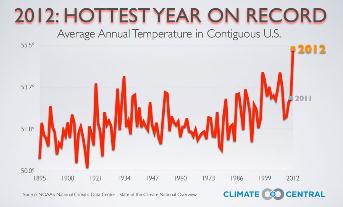 Fox News Questions Whether Government Faked Hottest Year On Record.
O.K. Time to put on your tin-foil hat and hold hands with some
anti-science conspiracy theorists. These people need new hobbies. Here's
an excerpt from Media Matters: "A Fox News.com article
questioned whether 2012 was actually the hottest year on record,
quoting "skeptics" who suggest a government office is manipulating data
to fabricate proof of rising temperatures. In fact, statistical
adjustments made by the agency are required, publicly-documented changes
to correct for errors and known sources of bias in the raw data. In
January, the National Climatic Data Center (NCDC) announced that 2012 was the hottest year on record in the contiguous U.S. - an announcement that Fox News ignored until one of Fox News' few liberal commentators, Bob Beckel, tried to bring it up on The Five. Soon after, FoxNews.com reporter Maxim Lott
solicited the views of a few professional climate "skeptics" to claim
that scientists made unjustified data adjustments to exaggerate 2012's
heat..."
Fox News Questions Whether Government Faked Hottest Year On Record.
O.K. Time to put on your tin-foil hat and hold hands with some
anti-science conspiracy theorists. These people need new hobbies. Here's
an excerpt from Media Matters: "A Fox News.com article
questioned whether 2012 was actually the hottest year on record,
quoting "skeptics" who suggest a government office is manipulating data
to fabricate proof of rising temperatures. In fact, statistical
adjustments made by the agency are required, publicly-documented changes
to correct for errors and known sources of bias in the raw data. In
January, the National Climatic Data Center (NCDC) announced that 2012 was the hottest year on record in the contiguous U.S. - an announcement that Fox News ignored until one of Fox News' few liberal commentators, Bob Beckel, tried to bring it up on The Five. Soon after, FoxNews.com reporter Maxim Lott
solicited the views of a few professional climate "skeptics" to claim
that scientists made unjustified data adjustments to exaggerate 2012's
heat..."
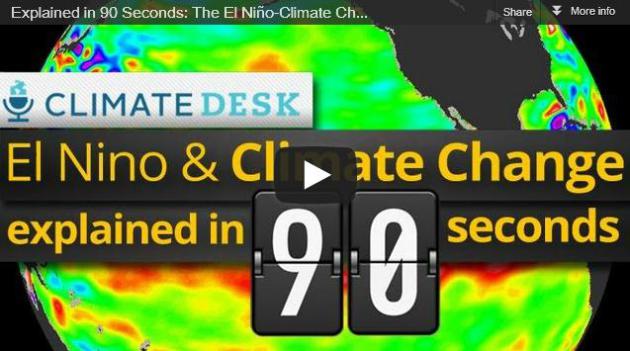 Explained In 90 Seconds: What Is Climate Change Doing To El Nino? Here's a snippet of a very interesting story (and video clip) from Mother Jones: "...For
the past seven years, Cobb and her lab team have been recontructing
the history of El Niño events across several millenia by taking core
samples from corals in the Pacific. That process has uncovered reams of
fresh climate data. And it's within this new, longer baseline of
temperatures from the tropical Pacific that Cobb spotted something
surprising: "The 20th century is significantly, statistically stronger
in its El Niño Southern Oscillation activity than this long, baseline
average," Cobb says. El Niño events have gotten worse.That led Cobb to
wonder: Is man-made climate change, and the level of carbon in the
atmosphere, shifting in El Niño events along with it? Or should we
chalk it up to coincidence?..."
Explained In 90 Seconds: What Is Climate Change Doing To El Nino? Here's a snippet of a very interesting story (and video clip) from Mother Jones: "...For
the past seven years, Cobb and her lab team have been recontructing
the history of El Niño events across several millenia by taking core
samples from corals in the Pacific. That process has uncovered reams of
fresh climate data. And it's within this new, longer baseline of
temperatures from the tropical Pacific that Cobb spotted something
surprising: "The 20th century is significantly, statistically stronger
in its El Niño Southern Oscillation activity than this long, baseline
average," Cobb says. El Niño events have gotten worse.That led Cobb to
wonder: Is man-made climate change, and the level of carbon in the
atmosphere, shifting in El Niño events along with it? Or should we
chalk it up to coincidence?..."
Freeze dried indeed.
Look at the bright side (literally): 20 minutes
of additional daylight since Dec. 21. In 2 weeks average temperatures
rise again!




Photo credit above: "Nobles County native Morton Bassett: "It was a beautiful day for mid-winter and no one even thought of what a change an hour's time could bring." Courtesy: Minnesota Historical Society.




Global temperature extreme map above courtesy of Ham Weather.

* the latest U.S. Drought Monitor is here.









Paul's Conservation Minnesota Outlook for the Twin Cities and all of Minnesota:
TODAY: Mix of clouds & sun. Wind chill: -10. Winds: NW 10+ High: 11
SUNDAY NIGHT: Partly cloudy. Low: 5
MONDAY: Bright sun, brisk. Light winds. High: 15
TUESDAY: Partly sunny, not as cold. Low: 10. High: 26
WEDNESDAY: Early thaw, then turning colder. Low: 18. High: 33
THURSDAY: Bright sun, numbing again. Low: 5. High: 12
FRIDAY: Mostly cloudy, flurries north. Low: 7. High: 17
SATURDAY: Brief reprieve, colder PM wind. Low: 10. High: 31
Climate Stories...
"Average U.S. temperatures have risen roughly 1.5 degrees F since 1895, and more than 80 percent of that increase has occurred since 1980, the report concludes." - excerpt of a story at The Hill
.
Impact Of Climate Change Hitting Home, U.S. Report Finds. Climate scientists have been saying this for 10-15 years or longer, and now it's dawning on most Americans that, yes, maybe something has changed. Here's an excerpt from Reuters: "The consequences of climate change are now hitting the United States on several fronts, including health, infrastructure, water supply, agriculture and especially more frequent severe weather, a congressionally mandated study has concluded. A draft of the U.S. National Climate Assessment, released on Friday, said observable change to the climate in the past half-century "is due primarily to human activities, predominantly the burning of fossil fuel," and that no areas of the United States were immune to change. "Corn producers in Iowa, oyster growers in Washington State, and maple syrup producers in Vermont have observed changes in their local climate that are outside of their experience," the report said..."

Photo credit above: "The report says steps taken by Obama to reduce emissions are 'not close to sufficient' to prevent the most severe consequences of climate change." Photo: Saul Loeb/AFP










Photo credit above: Reuters.





No comments:
Post a Comment